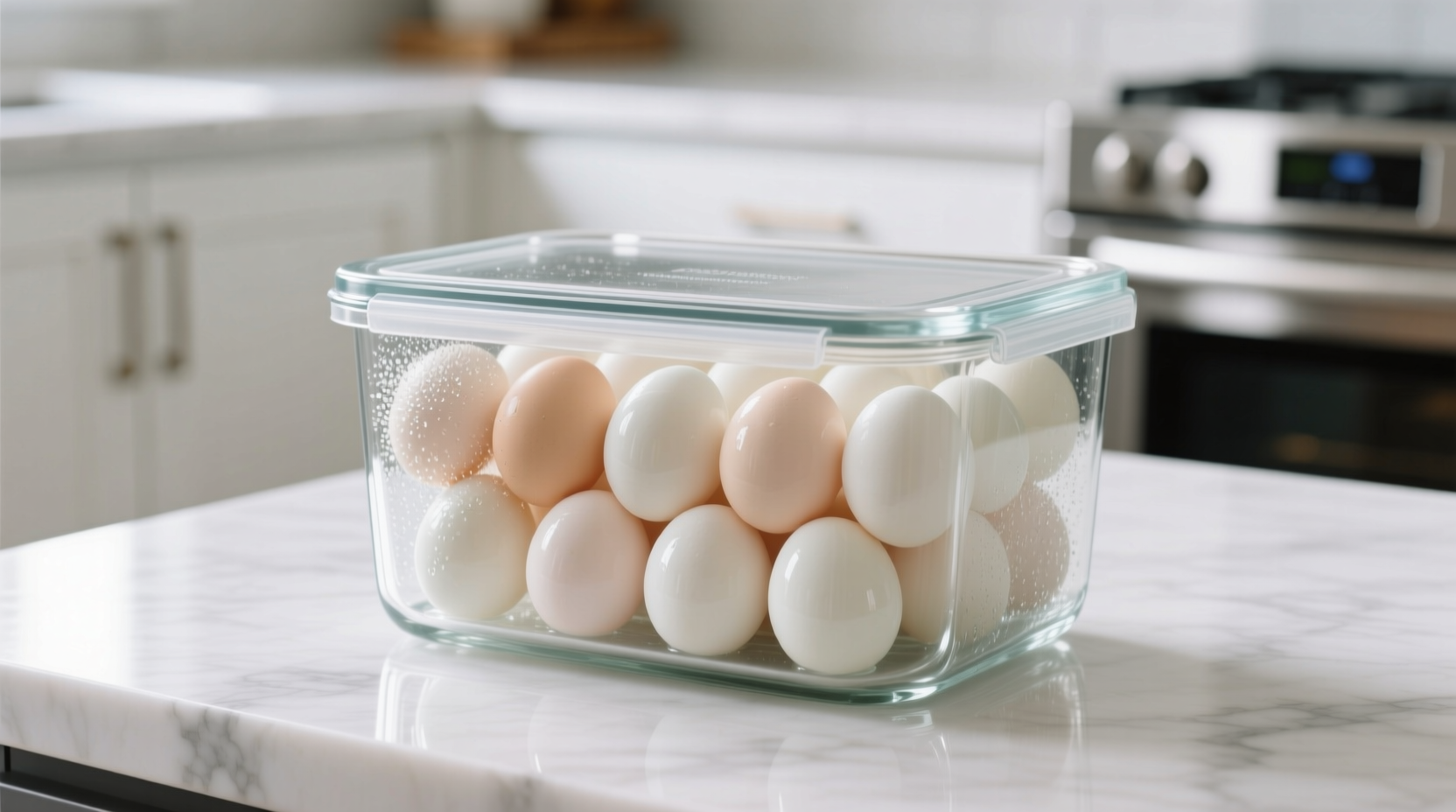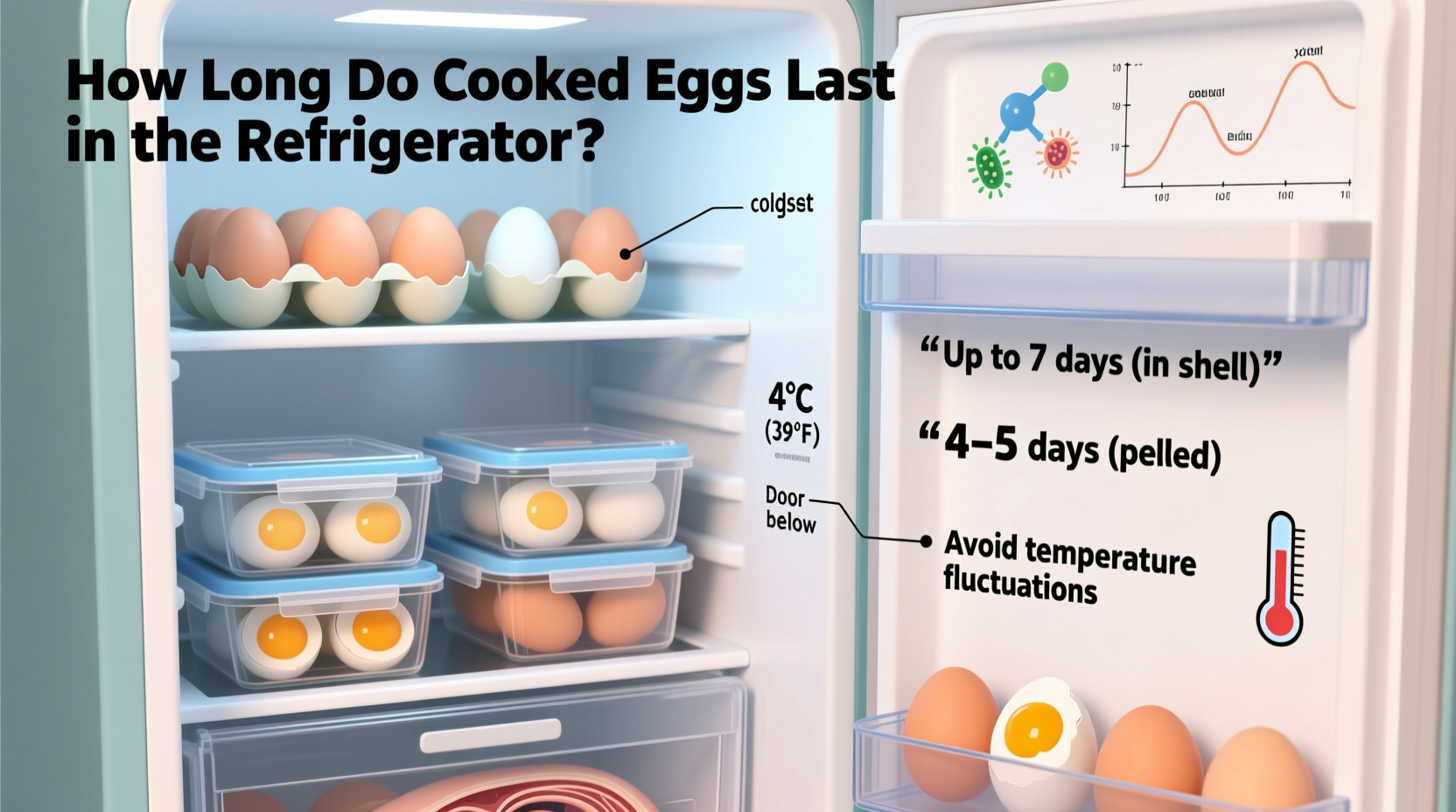Cooked eggs last 3-4 days in the refrigerator when stored properly at 40°F (4°C) or below. This applies to hard-boiled, scrambled, and other cooked egg preparations. Always store in airtight containers to maintain freshness and prevent cross-contamination.
The Complete Guide to Storing Cooked Eggs Safely
Understanding how long cooked eggs last in the refrigerator isn't just about convenience—it's a critical food safety concern. According to the USDA Food Safety and Inspection Service, improperly stored cooked eggs can harbor harmful bacteria like Salmonella, putting you at risk for foodborne illness. Let's explore exactly how to maximize both safety and freshness.

What Determines Cooked Egg Shelf Life?
The 3-4 day guideline isn't arbitrary. Several factors directly impact how long your cooked eggs remain safe to eat:
| Factor | Impact on Shelf Life | Best Practice |
|---|---|---|
| Initial cooking temperature | Undercooked eggs spoil faster | Cook until both whites and yolks are firm (160°F/71°C) |
| Cooling time before refrigeration | Leaving at room temperature >2 hours reduces shelf life | Cool within 2 hours (1 hour if room >90°F/32°C) |
| Storage container type | Air exposure accelerates spoilage | Use airtight containers, not egg cartons |
| Refrigerator temperature | Above 40°F (4°C) allows bacterial growth | Maintain 35-38°F (1.6-3.3°C) |
Timeline for Different Cooked Egg Types
While the general rule is 3-4 days, specific preparations have slightly different shelf lives:
- Hard-boiled eggs (peeled): 1 week maximum, but best within 3-4 days for optimal quality
- Hard-boiled eggs (unpeeled): Up to 1 week, as the shell provides additional protection
- Scrambled or fried eggs: 3-4 days maximum
- Egg salad or deviled eggs: 3-4 days due to additional ingredients
- Omelets with fillings: 3-4 days, but dairy-containing fillings may shorten shelf life
Critical Food Safety Practices for Cooked Eggs
Following proper storage techniques dramatically impacts how long cooked eggs remain safe to eat. The FDA Food Code emphasizes these critical steps:
Immediate Cooling Process
Never leave cooked eggs at room temperature for more than 2 hours (1 hour if ambient temperature exceeds 90°F/32°C). To cool quickly:
- Place cooked eggs in ice water bath immediately after cooking
- For large batches, divide into smaller containers
- Use shallow containers no deeper than 2 inches
Proper Refrigeration Techniques
Where you store cooked eggs matters as much as how you store them:
- Store on refrigerator shelves, not in door compartments (temperature fluctuates)
- Keep away from raw meat to prevent cross-contamination
- Label containers with preparation date
- Maintain consistent refrigerator temperature at 40°F (4°C) or below
How to Identify Spoiled Cooked Eggs
Don't rely solely on the calendar—always check for these spoilage indicators before consuming:
Visual Signs of Spoilage
- Discoloration (greenish or pinkish tinge)
- Visible mold (fuzzy spots of white, green, or black)
- Cloudy egg whites in stored hard-boiled eggs
Olfactory Indicators
- Sulfur or rotten smell (even if appearance seems normal)
- Sour or unpleasant odor
Texture Changes
- Slippery or slimy surface
- Unnaturally soft or mushy texture
If you detect any of these signs, discard the eggs immediately. The USDA Food Safety and Inspection Service emphasizes that when in doubt, throw it out—consuming spoiled eggs can cause serious foodborne illness.
Special Considerations for Food Safety
Certain situations require extra caution with cooked egg storage:
Eggs Prepared for Vulnerable Populations
For infants, elderly individuals, pregnant women, or immunocompromised people, the CDC recommends consuming cooked eggs within 24-48 hours rather than the standard 3-4 days. These groups face higher risks of severe complications from foodborne pathogens.
Travel and Picnic Safety
When transporting cooked eggs, use insulated containers with ice packs to maintain temperatures below 40°F (4°C). The FDA warns that perishable foods enter the "danger zone" (40-140°F/4-60°C) where bacteria multiply rapidly within just 20 minutes in warm conditions.
Maximizing Freshness Without Compromising Safety
While you shouldn't extend the 3-4 day safety window, these techniques help maintain optimal quality:
- Store hard-boiled eggs in their shells until ready to eat
- Place a damp paper towel in containers with peeled hard-boiled eggs
- For scrambled eggs, separate portions into single-serving containers
- Freeze cooked eggs for longer storage (up to 1 year, though texture changes)
Common Misconceptions About Cooked Egg Storage
Several widespread beliefs about egg storage are actually food safety risks:
- Myth: Hard-boiled eggs last longer than other cooked eggs Fact: While unpeeled hard-boiled eggs can last up to 1 week, peeled versions follow the standard 3-4 day rule
- Myth: The sniff test alone determines safety Fact: Harmful bacteria like Salmonella don't always produce noticeable odors
- Myth: Refrigeration stops bacterial growth completely Fact: It only slows growth; bacteria continue multiplying at refrigerator temperatures
When in Doubt, Follow the 3-4 Day Rule
Food safety experts consistently emphasize that the 3-4 day guideline for cooked eggs in the refrigerator isn't conservative—it's scientifically determined based on bacterial growth rates. The USDA Food Safety and Inspection Service states: "Cooked eggs and egg dishes may be refrigerated for serving later but must be thoroughly reheated to 165°F (73.9°C) before serving. Never leave cooked eggs at room temperature for more than 2 hours; this includes the time they're on the table during your meal."
By following these evidence-based storage practices, you'll maximize both the safety and quality of your cooked eggs while minimizing food waste.
Can you eat cooked eggs after 5 days in the refrigerator?
No, cooked eggs should not be consumed after 5 days in the refrigerator. The USDA Food Safety and Inspection Service recommends discarding cooked eggs after 3-4 days to prevent potential foodborne illness from bacterial growth.
Do hard-boiled eggs last longer than scrambled eggs in the fridge?
Unpeeled hard-boiled eggs can last up to 1 week in the refrigerator, while scrambled eggs should be consumed within 3-4 days. The protective shell of hard-boiled eggs provides an additional barrier against moisture loss and contamination.
How can you tell if cooked eggs have gone bad?
Signs of spoiled cooked eggs include a sulfuric or rotten smell, visible mold, slimy texture, or discoloration. If you notice any of these signs, discard the eggs immediately regardless of how many days they've been stored.
Is it safe to freeze cooked eggs?
Yes, cooked eggs can be safely frozen for up to 1 year. However, texture changes may occur—hard-boiled egg whites become tough and rubbery when frozen. For best results, freeze scrambled eggs or egg dishes rather than hard-boiled eggs.
What's the proper way to reheat cooked eggs?
Reheat cooked eggs to an internal temperature of 165°F (73.9°C) to ensure food safety. Use a food thermometer to verify temperature, especially for egg casseroles or quiches. Microwave reheating should be done in 30-second intervals with stirring to ensure even heating.











 浙公网安备
33010002000092号
浙公网安备
33010002000092号 浙B2-20120091-4
浙B2-20120091-4